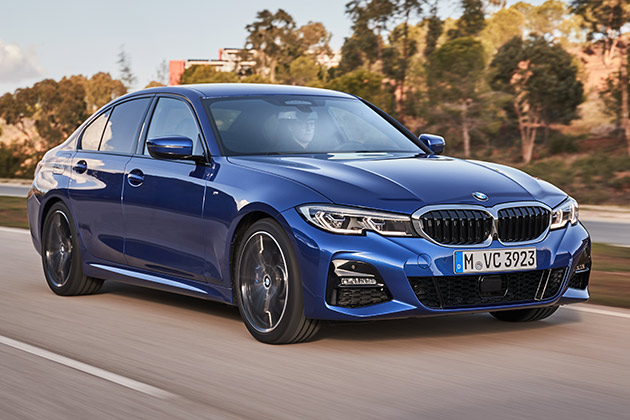BMW 330i
SUV popularity continues to erode medium-size prestige car sales and it’s a tough market for all its competing models. The race for your hard-earned cash remains close between the traditional European brands, and this year the reinvented Genesis, having untied the apron strings from Hyundai to become a standalone premium brand, has entered the mix.
Back in 1975, BMW’s first 3 Series was touted as the ‘ultimate driving machine’, and that DNA has flowed through the veins of successive models ever since. It’s no coincidence that the range has featured on the Australia’s Best Cars podiums every year since 2011, occupying top spot on four occasions.
The current 330i, launched earlier in 2019, is the seventh generation from the marque and is a product of evolution, with a carry-over 2.0-litre petrol engine and eight-speed automatic transmission, albeit with slightly more power and torque. BMW’s M Sport package is a standard no-cost option and, if buyers prefer, they can go for the Luxury Line option featuring different leather trim, minus the M Sport body kit.

Sporting a new-look, single-piece kidney grille and LED headlamps, the 330i’s silhouette is sharper and better integrated, enhanced with larger 19-inch alloys. Aerodynamically, the 330i has been improved to cut through the air more efficiently and 55 kilos have been shed (depending on spec) to reduce fuel consumption, putting it close to the hybrids in the category in terms of fuel economy.
The interior has had a complete makeover with a multi-configurable electronic instrument cluster, colour head-up display and 10.25-inch infotainment display. Leather trimmed seats deliver category-leading levels of comfort and the new design is more spacious, providing additional legroom in the rear. Ergonomically, the design is simpler and cleaner, with major controls operated via a rotary dial in the centre console, which is surrounded by key shortcut buttons.
BMW’s continuing pursuit of 50/50 front-to-rear weight distribution – aimed at striking a better-balanced and more dynamic chassis – continues to pay dividends, and this latest version is just as impressive as its forebears in balance and poise through the bends. The sporty flavour doesn’t compromise ride quality unduly, where the 330i remains at the forefront.
As a long-distance tourer the 330i would make an excellent choice. The 2.0-litre 190kW, 400Nm four-cylinder turbo engine is more than suited to the task. It feels sporty and responsive but with smoothness and quietness levels normally the domain of more luxurious and expensive models.
In second place, the all-new Genesis G70 2.0T inherits some of the attributes that made its larger sibling, the G80 (then known as a Hyundai Genesis), a former Australia’s Best Cars category winner. Those attributes included a long warranty and low running and repair costs, and the G70 builds on those strengths with an impressive set of on-road scores. Powering it is a 2.0-litre four-cylinder turbo engine developing 179kW and 353Nm, matched to an eight-speed automatic transmission.
For the third-placed Volkswagen Arteon, persistence had been rewarded as its predecessor CC sedan has always been amongst the front-runners in the category. The Arteon’s mechanical package features a 206kW, 350Nm four-cylinder turbo and seven-speed DSG, and the potent combination uses Volkswagen’s AWD system to get the power to the ground. The Arteon has a sporty attitude and feel on the road and it’s not far off the BMW 330i in its handling ability.
| Indicative drive-away: | $78,070 |
|---|---|
| Body type: | Sedan |
| Fuel economy/fuel type: | 6.4L/100km, premium unleaded 95 |
| Engine/transmission: | 2.0T, eight speed DSG |
| ANCAP: | 5 stars |
